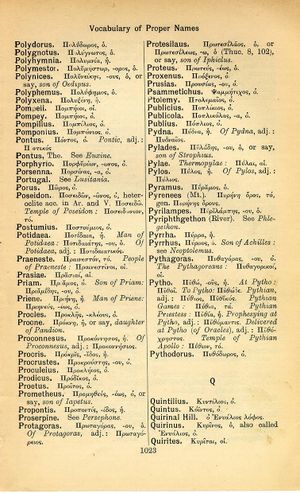Procne: Difference between revisions
From LSJ
Γυναιξὶ πάσαις κόσμον ἡ σιγὴ φέρει → Decus affert omni mulieri silentium → Es bringt das Schweigen Zierde einer jeden Frau
m (Text replacement - "link={{" to "link={{") |
m (Text replacement - "}}]]" to "}}]]") |
||
| Line 1: | Line 1: | ||
{{WoodhouseENELnames | {{WoodhouseENELnames | ||
|Text=[[File:woodhouse_1023.jpg|thumb | |Text=[[File:woodhouse_1023.jpg|thumb | ||
|link={{filepath:woodhouse_1023.jpg | |link={{filepath:woodhouse_1023.jpg}}]]Πρόκνη, ἡ, or say, <b class="b2">daughter of Pandion.</b> | ||
}} | }} | ||
{{Lewis | {{Lewis | ||
Revision as of 10:11, 15 August 2017
English > Greek (Woodhouse)
Πρόκνη, ἡ, or say, daughter of Pandion.
Latin > English (Lewis & Short)
Procnē: ēs, v. Progne.
Latin > French (Gaffiot 2016)
Procnē¹⁴ (-gnē), ēs, f. (Πρόκνη),
1 Procné [fille de Pandion, changée en hirondelle] : Ov. M. 6, 440 || [poét.] une hirondelle : Virg. G. 4, 15
2 île voisine de Rhodes : Plin. 5, 133.
Latin > German (Georges)
Procnē (Prognē), ēs, f. (Πρόκνη), I) Tochter des attischen Königs Pandion, Schwester der Philomela und Gemahlin des trazischen Königs Tereus, wurde in eine Schwalbe verwandelt (s. Philomēladas Nähere), Ov. met. 6, 440. Hyg. fab. 45 u.a. – II) meton., die Schwalbe, Verg. georg. 4, 15. Ov. fast. 2, 855; trist. 5, 1, 60: Progne inter asseres minuriens, Sidon. epist. 2, 2, 14.

